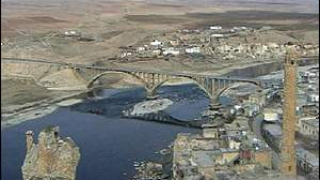Partner News
NGOs condemn signing of the contracts for Ilisu Dam by Société Générale, Bank Austria and DekaBank
Irregularities at beginning expropriation in reservoir area
2007-08-15
| Berlin/Frankfurt
Urgewald
Heike Drillisch, WEED, +49 (0)177 - 345 26 11
Ulrich Eichelmann, Eca-Watch Austria, +43 (0)676 8348 8279
Christine Eberlein, Berne Declaration, +41 (44) 2777 008
Martin Glasenapp, medico international, +49 (0)69 9443821
Heffa Schücking, urgewald, +49 (0)160 - 96761436

Photo: -
2007-08-15
| Berlin/Frankfurt
Urgewald
Heike Drillisch, WEED, +49 (0)177 - 345 26 11
Ulrich Eichelmann, Eca-Watch Austria, +43 (0)676 8348 8279
Christine Eberlein, Berne Declaration, +41 (44) 2777 008
Martin Glasenapp, medico international, +49 (0)69 9443821
Heffa Schücking, urgewald, +49 (0)160 - 96761436
The Turkish government and German DekaBank, French Societe Generale and Bank Austria have signed the financial contract for the highly controversial Ilisu Dam in Southeast Turkey.
Earlier this week, the final delivery contracts were signed already with the construction companies, including Andritz AG (Austria), Alstom Switzerland and Zueblin (Germany). A broad coalition of non-governmental organizations and civil society initiatives in Europe and Turkey criticize the European banks for entering into this project with devastating ecological, social and cultural impacts. At the same time, villagers in the reservoir area resist their expropriation by going to court.
"By supporting the Ilisu project, Société Générale, Bank Austria and DekaBank demonstrate a deep disregard of environmental criteria and extreme disrespect for the affected population", states Heike Drillisch of the environmental and development organisation WEED. "The destructive potential of the Ilisu dam exceeds everything that would be conceivable in Europe. No responsible bank would take part in it." The World Bank and other European banks had declined to fund the project.
"Ilisu is more than a cultural, human and environmental catastrophe in Turkey", states Ulrich Eichelmann from eca-watch Austria. "It is a European scandal demonstrating how little attention companies, banks and politicians involved give to international standards, when great sums of money are involved."
The Ilisu project will dam the Tigris shortly before the border to Syria and Iraq, and will flood the antique city of Hasankeyf as well as countless further cultural sites and valuable habitats for threatened animal species. Tens of thousands of affected people, predominantly Kurds, will lose their current basis of existence. Protests of the affected population and Iraqi government were ignored.
"The project documents reveal that not even the fundamental data concerning the environment and the cultural properties which are given to the destruction are available", emphasises Heffa Schuecking of the environmental and human rights organisation urgewald.
At the end of March, the German, Austrian and Swiss governments granted export credit guarantees for the Ilisu project. These agreements are tied to about 150 obligations, which are supposed to bring the project in line with international standards. They include the demand to collect basic data on the ecological and cultural assets in the affected region. "Without the presence of reliable data and management plans, the World Bank would not even start to assess the project", states Christine Eberlein from Swiss Berne Declaration.
Meanwhile, the expropriation of property has started in the Ilisu region under gross violation of the obligations imposed by the export credit agencies, according to information by the 'Initiative to Keep Hasankeyf Alive'. Consequently, nearly all families concerned filed complaints against the responsible water authority before court. However, the water authority announced not to accept the judgement. In no case the sums will be sufficient to enable families to achieve an adequate livelihood in the surrounding cities.
"All our former concerns are confirmed by how expropriation is starting", criticizes Ercan Ayboga of the 'Initiative to Keep Hasankeyf Alive'. "The people are given pittance and are abandoned to their fate. The resistance in the region will continue. DekaBank and the other banks should be aware of this.
"Whoever hopes that by signing the contracts the resistance will fade away, is mistaken", the NGOs confirm. "We will continue to inform people in Europe including the involved banks' clients about this incredible project and its flaws."
The charity organisation medico international recalls the German government's continued obligation to stop the project. "We urge all parties represented in the German parliament to have a parliamentary delegation to Hasankeyf investigate the disrespect by Turkish authorities for the conditions tied to the export credit guarantees", demands medico international's Martin Glasenapp.
Non-governmental organizations
WEED - Eca-Watch Austria - Berne Declaration - Initiative to Keep Hasankeyf Alive - BankTrack - Network - medico international -Informationsstelle Kurdistan - Verband der Studierenden aus Kurdistan (yxk) - Zanin Hannover - International Rivers Network (IRN) - urgewald
Dodgy Deals
There are no active project profiles for
this item now.
